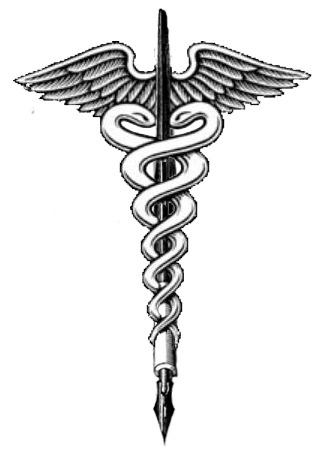|
Anatomy: A Privilege and a Joy — by Eric Lu
I had a nightmare about anatomy the night before my first dissection. I was in anatomy lab and had my scalpel plunged into an unknown body. As I pulled out the scalpel, a piece of flesh came flying out and shot into my gaping mouth. Needless to say, the next morning in lab I was very careful to keep my mouth shut.
My first cut was down the middle of his back. At first, it was a tiny scrawl as I got used to holding a scalpel. Then, I began applying more pressure until the blade sunk into the skin, through the fat, and into the rest of the body. A layer of bright yellow subcutaneous fat swallowed my scalpel and, pretty soon, I was engrossed in this new realm of anatomy.
There is something satisfying about first finding and then feeling all the different kinds of muscles, nerves, and vessels against your fingers, from the slippery firmness of the muscles in the leg to the intricate web of nerves of the brachial plexus in the arms. Each area of dissection requires a different touch. While I could plunge my fingers into the thighs and dig around, I had to be a lot more careful using my scalpel and forceps to tease out the delicate muscles, nerves and vessels in the hands and feet.
I finally feel like I’m in medical school, but I can’t help feeling that the process of desensitization has begun. Initially, dissecting a human body felt to me a bit unnatural, but even after just a week I already feel less discomfort cutting off skin, pulling on muscles, and cracking bones. When I’m so focused on a body part, I sometimes forget that there is a person lying before me. All I can focus on is finding the right muscles or clearing away the fat. We found a large tumor the other day near the groin, and I thought that was cool, but it probably wasn’t very cool for its owner.
In the six weeks of anatomy lab, I have gotten to know this man better than he could have ever known himself. My anatomy lab partners and I separated the various layers of muscles that once helped him walk, hug, write, laugh, and cry. We held in our hands his lungs that once filled with air, his heart that once pumped blood, and his stomach that once digested food. We split his kidneys in half, opened his bladder, and cut into his genitalia. His skull was sawed three ways and his face separated and divided in two. The brain felt like firm tofu in my hands – cold, dense and rigid. My last cut on our body was across the top of his eye, cleaning away the mound of fat resting in his orbits. I made my last cut, named off the nerves and muscles surrounding the eye, took one last look at our body, and closed up the black body bag.
While we came away knowing what this man was made of, we still had no idea who he was. What was his name? Did he have a wife and children? What did he like to do? Did he have any regrets? The pathologist, after showing us the clogged bronchioles in his lungs, pronounced that he had died of pulmonary embolism. “It was a quick death,” he said. And just like that, our mystery man had an identity. He was no longer just our body. He was the guy who died of pulmonary embolism.
They say that anatomy is a privilege. I say that anatomy is both a privilege and a joy. It is the joy of learning in such an intimate manner. It is the joy of marveling at the intricacies and beauty of the human body. And it is the joy of truly appreciating the lives of those who donated their bodies for us to benefit from.
#3887. The guy who died of pulmonary embolism. Whoever you are. Thank you.
|
